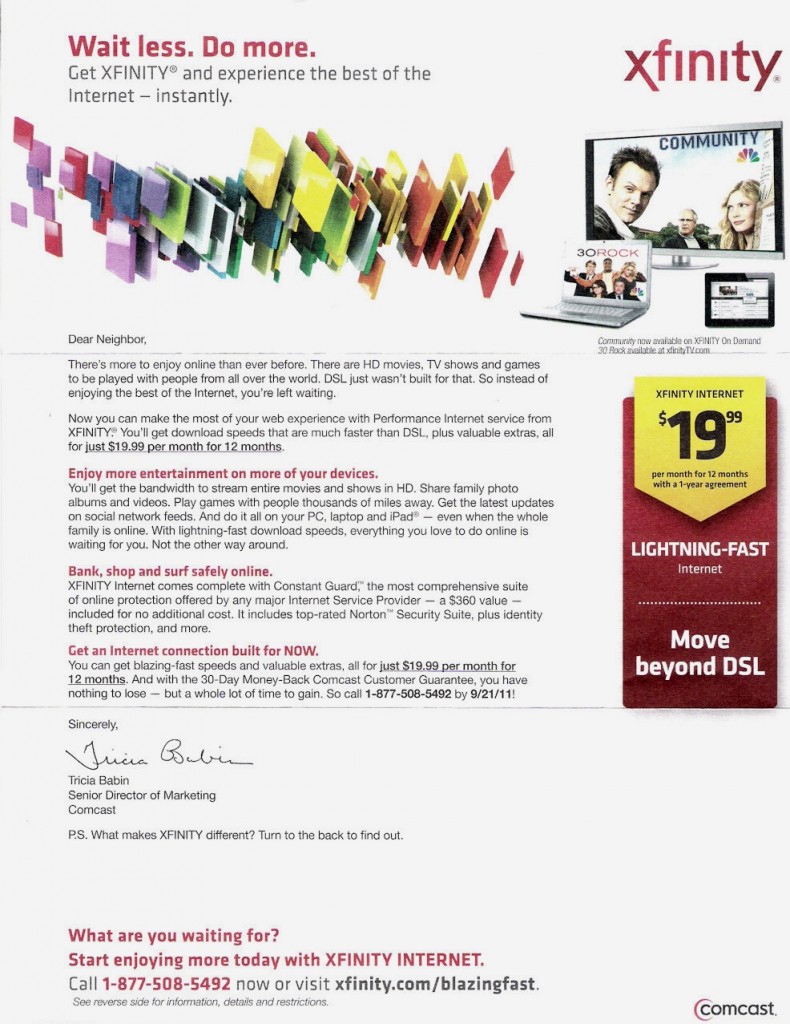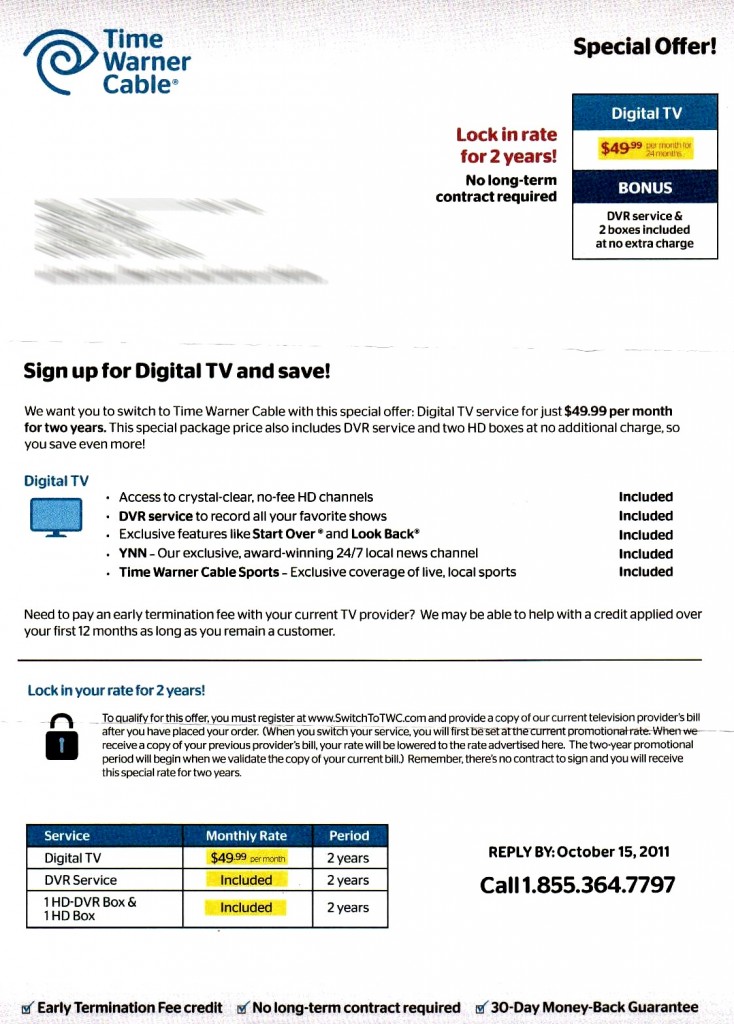
1.5Mbps "broadband" is not the cure-all Comcast claims it to be.
When multi-billion dollar Comcast Corporation decided it was the right time to acquire multi-billion dollar NBC-Universal, one of the concessions Comcast made to win federal approval of the deal was to deliver budget-priced Internet service to those too poor to pay the company’s current asking price of $40-60 a month.
Comcast Internet Essentials was the result, and as Comcast rolls its publicity train from city to city, promoting the new package, politicians and cable executives have teamed up to take credit, suggesting the company’s limited-access $9.95 1.5Mbps service will somehow erase the high-tech job deficit, eliminate the digital divide, and will even somehow help America’s broadband speed gap with the rest of the world.
But it will do none of those things for the vast number of income-challenged families who won’t actually qualify for the three year program, either because they already scrape up enough for Comcast service, don’t have children, or manage to miss a payment due date. In fact, 1.5Mbps budget-priced Internet is a service providers should have been willing to offer all along, to anyone who wants the service. But it took a colossal-sized merger concession to get Comcast to sort of do the right thing.
I say “sort of” because the terms and conditions that accompany the service resemble the gotcha fine print the banking industry so loves:
The program is only available to households that (i) are located where Comcast offers Internet service; (ii) have at least one child who receives free school lunches through the National School Lunch Program (the “NSLP”) and as confirmed annually while enrolled in the program; (iii) do not have an overdue Comcast bill or unreturned equipment; and (iv) have not subscribed to any Comcast Internet service within the last ninety (90) days (sections 1(i)-(iv) collectively are defined as “Eligibility Criteria”). This program is not available to households that have children who receive reduced price lunches under the NSLP. The program will accept new customers for three (3) full school years, unless extended at the sole election of Comcast. Comcast reserves the right to establish enrollment periods at the beginning of each academic year in which it accepts new customers that may limit the period of time each year in which you have to enroll in the program.
2. In order to confirm your eligibility for the program, Comcast will need to verify that your children receive free school lunches through the NSLP in the initial enrollment year and each subsequent year you are enrolled in the program. In order to confirm eligibility, participants in the program will be required to provide copies of official documents establishing that a child in the household is currently receive free school lunches through the NSLP. Each year you will be required to reconfirm your household’s current eligibility by providing Comcast or its authorized agent with up-to-date documentation. If you fail to provide documentation proving your eligibility in the program, you will be deemed no longer eligible to participate in the program.
3. You will no longer be eligible to participate in the program if (i) you no longer have at least one child living in your household who receives free school lunches under the NSLP; (ii) you fail to maintain your Comcast account in good standing; (iii) Comcast ceases to provide the Covered Service to your location; or (iv) your account opened under the program is closed. A change in address may result in your account being closed, even if you continue to receive Comcast services at a different address. Program participation also may be terminated if the Covered Service is upgraded, altered or changed by you for any reason. If you are no longer eligible for the program, but continue to receive the Covered Service from Comcast, regular rates, and any other applicable terms and conditions will apply to the Covered Service.
 No kids in your home? No discount Internet access for you! Refuse on principle to accept a government handout to pay for school lunches? Sorry, you need to buy the full-priced Internet Comcast will happily sell you. Missed a cable bill payment because you needed to buy medicine this month? It will cost you your inexpensive access. Comcast even reserves the right to cancel your discounted service if you choose (or are forced) to move.
No kids in your home? No discount Internet access for you! Refuse on principle to accept a government handout to pay for school lunches? Sorry, you need to buy the full-priced Internet Comcast will happily sell you. Missed a cable bill payment because you needed to buy medicine this month? It will cost you your inexpensive access. Comcast even reserves the right to cancel your discounted service if you choose (or are forced) to move.
Most would-be customers who assume they are eligible because they, like so many others, are income-challenged these days, are thrilled to read and watch news accounts about the discount Internet program for their kids. But like Santa reneging on Christmas, the excitement turns to disappointment when they discover they are ineligible for one reason or another.
In Baltimore, WBAL-TV got nearly breathless with excitement telling their audience, “Things are looking up for Maryland families — way up. A new effort is under way to help connect 250 families to cyberspace at an affordable price.”
Baltimore is a city of 620,000 people. Before the Great Recession, 15.4% of families and 19.3% of Baltimore’s residents fell below the poverty line, excellent candidates for inexpensive Internet access. That’s more than 32,000 people, but Comcast is apparently making room for just 250.
Despite those figures, Comcast’s David Cohen thinks his company’s discount Internet will make all the difference.
“We believe we have a shot to be able to make a real impact on the digital divide with this program,” he told the Baltimore TV station.
He might be right… for 250 families anyway. Everyone else… pay up or go without.

Terms and conditions apply
WBAL Investigative reporter Jayne Miller got slightly carried away on behalf of Comcast, equating their program with a solution for high-tech jobs and increased Internet speed:
Internet access and speeds have become national issues. The U.S. lags behind other countries in broadband availability, hurting what some believe to be the nation’s ability to compete, said Miller.
In comparison, “China recently graduated over 440,000 engineers, and we in the U.S. graduated 65,000,” said U.S. Rep. “Dutch” Ruppersberger.
I’m sorry to bring people back to reality, but 250 families getting the right to buy up to three years of Internet access at speeds that are half of what the FCC National Broadband Plan defines as actual broadband is not an answer to anything beyond Comcast’s poor public relations in the customer service department. It’s not going to help America’s broadband speed rating (it will actually hurt it at 1.5Mbps).
WBAL is hardly the only station overdoing their celebrations of Comcast (a prolific advertiser by the way). I’ve watched reports that suggest Comcast is doing this out of the goodness of their heart, not because they agreed to as a condition of their mega-merger with NBC. Considering the lawyer-like limitations that are certain to keep many people out of the program and others from downgrading their existing service to something more affordable, charity is hardly a word I would extend to the nation’s largest cable operator who found cause to limit access to even the lowest broadband speeds to protect its bottom line, which it hopes will get much fatter with the acquisition of NBC-Universal. When the three year program ends, let’s just see how charitable Comcast is about extending it.
[flv width=”480″ height=”290″]http://www.phillipdampier.com/video/KASA Santa Fe Internet Accessibility with Internet Essentials 8-26-11.mp4[/flv]
KASA-TV in Santa Fe talks with their “very good friend at Comcast” about Internet Essentials and the company’s general Internet expansion plans in New Mexico. The interview resembles an infomercial for Comcast products and services. (5 minutes)


 Subscribe
Subscribe







